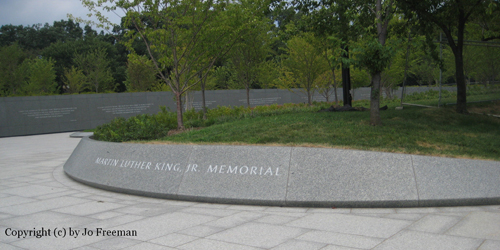The "Most notorious liar in the country" Gets a Memorial
on the Mall
by Jo Freeman
Unfortunately, it was Hoover’s FBI agents who were the public face of the federal government in the South. The fact that they only took notes when they watched civil rights workers being beaten, failed to investigate when local people were killed, and even informed on us to local law enforcement, did not generate trust in the federal government. Few of us in the field were aware of the other side of the Justice Department – the attorneys who spent weeks gathering evidence for court cases to close down the institutions of white supremacy.

Dr. King saw both sides. He also knew that Presidents had many demands made on them and that public opinion could offset Presidential deference to conservative Congressional committee chairs. He believed in America. He knew that mass demonstrations that generated major national publicity was the way to reach the conscience of America.
Presidents Kennedy and Johnson did not like these demonstrations, arguing that they made it harder to pass new civil rights bills. They were also concerned that publicity about racial discontent would be used in the propaganda war with the Soviet Union.
Yet we now know that President Kennedy revised the proposals that became the 1964 Civil Rights Act largely in response to the May 1963 Birmingham demonstrations, and that President Johnson accelerated passage of the Voting Rights Act by a year in response to the 1965 Selma demonstrations.
After Dr. King was assassinated in 1968, many commented that he had preached about his coming death only the month before, as though he had a premonition. I heard him preach that sentiment in 1966. All of us on the SCLC staff knew that he would not die a natural death. Short of retiring to a monastery, it was only a matter of who would kill him, when and how.
Dr. King lived a life of sacrifice and died a tragic death. He was at the forefront of one of the great revolutions of the 20th Century. It is fitting that the nation should honor him with a memorial, near that honoring Abraham Lincoln and about a mile away from the J. Edgar Hoover FBI Building.
Further Reading
Garrow, David J., The FBI and Martin Luther King, Jr.: From 'Solo' to Memphis, New York: Norton, 1981.
O'Reilly, Kenneth, "Racial Matters" The FBI’s Secret File on Black America, 1960-1972, New York: Free Press, 1989.
US Congress, Senate, Select Committee to Study Governmental Operations with Respect to Intelligence Activities, (Church Committee) Hearings on Intelligence Activities, Senate Resolution 21, 94th Cong. 1st Sess, Volume 6: Federal Bureau of Investigation, November 18 – December 11, 1975. http://www.aarclibrary.org/publib/contents/church/contents_church_reports_vol6.htm
______, Supplementary Detailed Staff Reports on Intelligence Activities and the Rights of Americans, Books II and III, Final Report, April 23, 1976 http://www.aarclibrary.org/publib/contents/church/contents_church_reports_book3.htm
©2011 Jo Freeman for SeniorWomen.com
Listen to the I Have a Dream speech
Page 1 2
Books by Jo | What's New | About Jo | Photos | Political Buttons
Home | Search | Links | Contact Jo | Articles by Jo